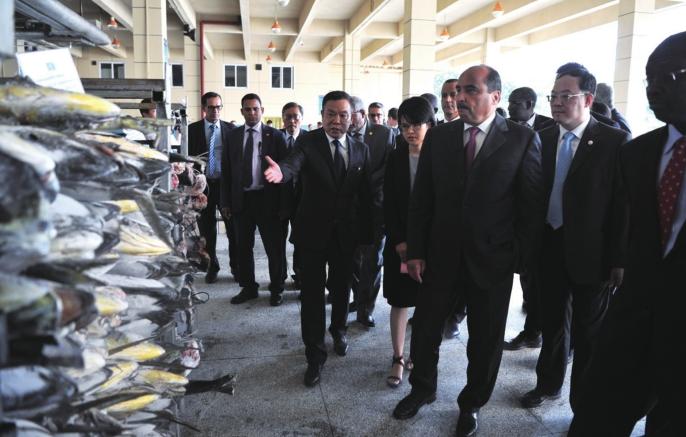Future Empowerment
By Gitonga Njeru


Hussein Hamed, 23, a fisherman based in the Mauritanian capital of Nouakchott, catches about $3,500 worth of fish per year, but only 10 percent of his catch is processed in factories nearby. The remainder is sold at giveaway prices to customers on the streets of the city since there are few fish processing plants in the country.
With the Mauritanian Government recently announcing that it will license several Chinese companies to open up businesses in his country, Hamed is optimistic that his income will grow.
“Currently, I make little from fishing. A big chunk of my catch spoils because I do not have enough refrigeration facilities. I am happy that Chinese companies will open up fi sh processing plants. My income will rise, as there will be more chances to have my caught fi sh processed and sold,” Hamed said.
With the help of new fi sh processing facilities, he estimated that the increase in business would generate an extra $12,000 annually for him. This would allow him to buy a house.
Range of investments
Hamed is just one of many local Mauritanians set to benefit economically once Chinese investors, mostly in the manufacturing, processing and construction industries, start operating in the country in the second half of 2019.
The initiative came about as part of a trade and investment agreement signed between the two governments in March 2017.
This has allowed 13 Chinese companies to set up operations in Mauritania this year. The companies, ranging from small, medium and large operations, are involved in everything from food processing and construction to service industries such as banking.
Some notable Chinese companies that will be doing business in the country include Huajia Foodstuff Co., Yantai Connor Foodstuff Co. and some online trading companies such as the globally renowned e-commerce giant Alibaba Group.
One of the sectors of the local economy to receive the largest boost from this investment is fi shery. The industrys production capacity has been declining for years due to many domestic and international challenges.
According to the United Nations Food and Agriculture Organization (FAO), only 5 percent of Mauritanias fish catch is processed, despite over 1.2 million tons of tuna being caught annually. The FAO lists shrimp and tuna as the most common marine species being caught each year in Mauritanian waters. Chinese companies will invest in this sector, as well as other areas of the countrys economy, bringing job opportunities and increased earning capacity for local people like Hamed. Mauritania has the potential to produce over 11.5 million tons of fish per year based on increased investment, according to the FAO.
“There are great prospects in this industry, considering that Mauritania has some of the best fish stocks in the world,” said Ismail Ould Cheikh Ahmed, Mauritanian Minister of Foreign Affairs. “We are happy that the completed construction of the Tanit Fishing Port Project in the port of Nouakchott [by PowerChina Harbor Co.] is a success. There will be more similar projects between my country and China in the near future.”

Mauritania is also seeking Chinas help in security arrangements to tackle illegal fishing within its territorial waters, he added.
Good prospects
Mauritania is divided into 12 regions in an area covering about 1.03 million square km, with a population of 4.42 million. It had a GDP of $5 billion in 2017. The chief economic activities are agriculture, animal husbandry and mining, according to data from the International Monetary Fund.
“We will increase mineral production, instead of exporting raw iron, gold and copper ores, we will process them once Chinese investors open up processing plants in the country,” Ahmed said. “We expect the economy to grow by 2 percent this year and have better growth projections for the next few years at about 7 percent annually starting in 2021.”
One of the Chinese companies that is performing well in Mauritania is Poly Hon Done Pelagic Fishery Co. It signed a $100-million agreement with Mauritania for a 25-year lease on fishing rights and plans to open three fi sh processing plants by mid-2020 to deal with the growing demand. Already, 4,000 jobs have been created since the deal was struck in 2011, according to Ahmed.

“In the future, there is a need for foreign direct investment in some of the countrys chief cash crops of sorghum, millet, rice and maize. More Chinese agricultural companies have applied for operating licenses. The applications are being reviewed and approvals are expected soon. But 13 companies have already been approved,” Ahmed said.
The increase in Chinese investment in Mauritania, and Africa in general, means that initiatives like the China-proposed Belt and Road Initiative will have to increase the transportation network for effective trade to thrive. According to the World Bank, only 10,612 km of road network exists in Mauritania. Experts say that more has to be done by the government for efficient economic growth and development to be realized.
“Obviously, with an area of more than 1 million square km, we need about 100,000 km [of roads] in the quickest possible time frame,” Ahmed said. “Im glad that we are part of the Belt and Road Initiative, which augurs well for the future. A good road network is essential for business to thrive.”
He said Mauritanias per-capita GDP is expected to increase to $1,500 by 2020. Economists say the countrys abundant potential and resources are untapped.
“Mauritania has potential. Its just a matter of time before it makes major strides in the global economic arena. It is endowed with minerals such as iron, gold and copper. Only a small portion of those resources are economically exploited to their potential,” said Harris Mule, a renowned Kenyan economist.
In addition, according to offi cial statistics, the number of foreign tourists to Mauritania increased by 166 percent in 2018, going from 1,500 in 2017 to 4,000. Mule said these fi gures are expected to grow even more.

